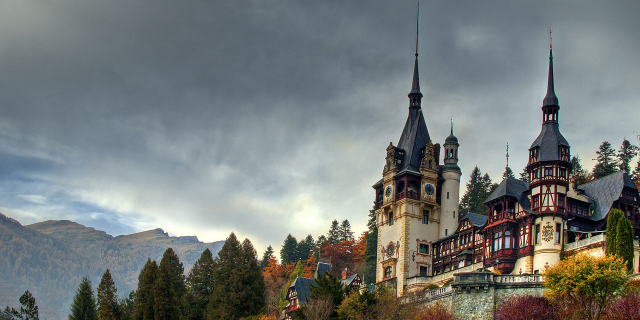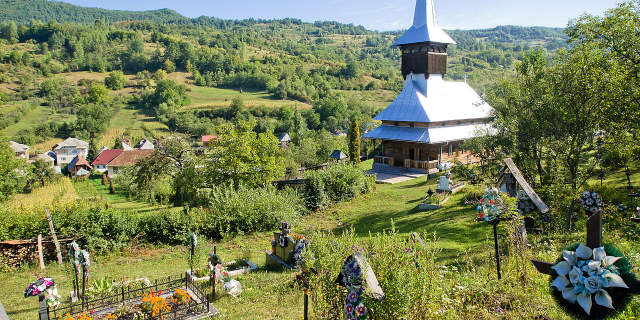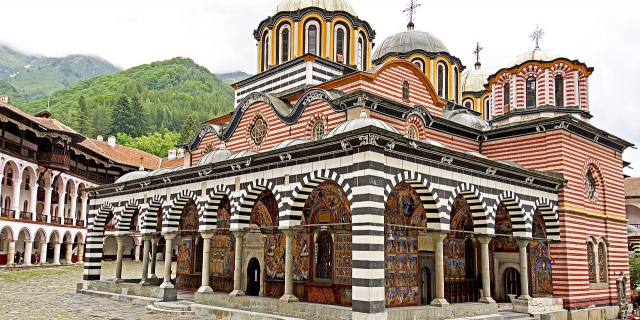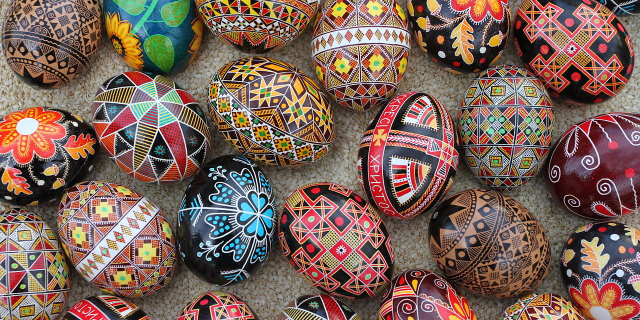România
RomaniaContext of Romania
Romania ( (listen) roh-MAY-nee-ə; Romanian: România [romɨˈni.a] (listen)) is a country located at the crossroads of Central, Eastern, and Southeastern Europe. It borders Bulgaria to the south, Ukraine to the north, Hungary to the west, Serbia to the southwest, Moldova to the east, and the Black Sea to the southeast. It has a predominantly temperate-continental climate, and an area of 238,397 km2 (92,046 sq mi), with a population of under 18.9 million inhabitants (2023). Romania is the twelfth-largest country in Europe and the sixth-most populous member state of the European Union. Its capital and largest city is Bucharest, followed by Iași, Cluj-Napoca, Timișoara, Constanța, Craiova, Brașov, and Galați.
Europe's second-longest river, the Danube, rises in Germany's B...Read more
Romania ( (listen) roh-MAY-nee-ə; Romanian: România [romɨˈni.a] (listen)) is a country located at the crossroads of Central, Eastern, and Southeastern Europe. It borders Bulgaria to the south, Ukraine to the north, Hungary to the west, Serbia to the southwest, Moldova to the east, and the Black Sea to the southeast. It has a predominantly temperate-continental climate, and an area of 238,397 km2 (92,046 sq mi), with a population of under 18.9 million inhabitants (2023). Romania is the twelfth-largest country in Europe and the sixth-most populous member state of the European Union. Its capital and largest city is Bucharest, followed by Iași, Cluj-Napoca, Timișoara, Constanța, Craiova, Brașov, and Galați.
Europe's second-longest river, the Danube, rises in Germany's Black Forest and flows southeasterly for 2,857 km (1,775 mi), before emptying into Romania's Danube Delta. The Carpathian Mountains cross Romania from the north to the southwest and include Moldoveanu Peak, at an altitude of 2,544 m (8,346 ft).
Settlement in what is now Romania began in the Lower Paleolithic followed by written records attesting the kingdom of Dacia, its conquest, and subsequent Romanization by the Roman Empire during late antiquity. The modern Romanian state was formed in 1859 through a personal union of the Danubian Principalities of Moldavia and Wallachia. The new state, officially named Romania since 1866, gained independence from the Ottoman Empire in 1877. During World War I, after declaring its neutrality in 1914, Romania fought together with the Allied Powers from 1916. In the aftermath of the war, Bukovina, Bessarabia, Transylvania, and parts of Banat, Crișana, and Maramureș became part of the Kingdom of Romania. In June–August 1940, as a consequence of the Molotov–Ribbentrop Pact and Second Vienna Award, Romania was compelled to cede Bessarabia and Northern Bukovina to the Soviet Union and Northern Transylvania to Hungary. In November 1940, Romania signed the Tripartite Pact and, consequently, in June 1941 entered World War II on the Axis side, fighting against the Soviet Union until August 1944, when it joined the Allies and recovered Northern Transylvania. Following the war and occupation by the Red Army, Romania became a socialist republic and a member of the Warsaw Pact. After the 1989 Revolution, Romania began a transition towards democracy and a market economy.
Romania is a developed country and an emerging middle power in international affairs. Romania has a high-income economy, being the world's 47th largest economy by nominal GDP, and the 36th largest by PPP. Romania experienced rapid economic growth in the early 2000s; its economy is now based predominantly on services. It is a producer and net exporter of machines and electric energy through companies like Automobile Dacia and OMV Petrom. The majority of Romania's population are ethnic Romanians and religiously identify themselves as Eastern Orthodox Christians, speaking Romanian, a Romance language (more specifically Eastern Romance/Daco-Romance). The Romanian Orthodox Church is the largest religious denomination in the country. Romania is a member of the United Nations, the European Union, NATO, the Council of Europe, BSEC and WTO.
More about Romania
- Currency Romanian leu
- Native name România
- Calling code +40
- Internet domain .ro
- Mains voltage 230V/50Hz
- Democracy index 6.4
- Population 19053815
- Area 238397
- Driving side right
- Prehistory
 Skull from the Peștera cu Oase (the oldest known remains of Homo sapiens in Europe)[1]
Skull from the Peștera cu Oase (the oldest known remains of Homo sapiens in Europe)[1]Human remains found in Peștera cu Oase ("Cave with Bones"), radiocarbon date from circa 40,000 years ago, and represent the oldest known Homo sapiens in Europe.[1] Neolithic agriculture spread after the arrival of a mixed group of...Read more
PrehistoryRead less Skull from the Peștera cu Oase (the oldest known remains of Homo sapiens in Europe)[1]
Skull from the Peștera cu Oase (the oldest known remains of Homo sapiens in Europe)[1]Human remains found in Peștera cu Oase ("Cave with Bones"), radiocarbon date from circa 40,000 years ago, and represent the oldest known Homo sapiens in Europe.[1] Neolithic agriculture spread after the arrival of a mixed group of people from Thessaly in the 6th millennium BC.[2][3] Excavations near a salt spring at Lunca yielded the earliest evidence for salt exploitation in Europe; here salt production began between the 5th and 4th millennium BC.[4] The first permanent settlements developed into "proto-cities",[5] which were larger than 320 hectares (800 acres).[6][7] The Cucuteni–Trypillia culture—the best known archaeological culture of Old Europe—flourished in Muntenia, southeastern Transylvania and northeastern Moldavia in the 3rd millennium BC.[7] The first fortified settlements appeared around 1800 BC, showing the militant character of Bronze Age societies.[7]
Antiquity Maximum territorial extent of the Kingdom of Dacia during Burebista's reign (early 40s BC)
Maximum territorial extent of the Kingdom of Dacia during Burebista's reign (early 40s BC)Greek colonies established on the Black Sea coast in the 7th century BC became important centres of commerce with the local tribes.[8][9] Among the native peoples, Herodotus listed the Getae of the Lower Danube region, the Agathyrsi of Transylvania and the Syginnae of the plains along the river Tisza at the beginning of the 5th century BC.[10] Centuries later, Strabo associated the Getae with the Dacians who dominated the lands along the southern Carpathian Mountains in the 1st century BC.[11] Burebista was the first Dacian ruler to unite the local tribes.[11][12] He also conquered the Greek colonies in Dobruja and the neighbouring peoples as far as the Middle Danube and the Balkan Mountains between around 55 and 44 BC.[11][13] After Burebista was murdered in 44 BC, his kingdom collapsed.[11][14]
Ruins of sanctuaries at Sarmizegetusa Regia (Dacia's capital during the reigns of Burebista and Decebalus)The Romans reached Dacia during Burebista's reign and conquered Dobruja in 46 AD.[14] Dacia was again united under Decebalus around 85 AD.[11][15] He resisted the Romans for decades, but the Roman army defeated his troops in 106 AD.[16] Emperor Trajan transformed Banat, Oltenia and the greater part of Transylvania into a new province called Roman Dacia, but Dacian, Germanic and Sarmatian tribes continued to dominate the lands along the Roman frontiers.[17][18] The Romans pursued an organised colonisation policy, and the provincials enjoyed a long period of peace and prosperity in the 2nd century.[19][20] Scholars accepting the Daco-Roman continuity theory—one of the main theories about the origin of the Romanians—say that the cohabitation of the native Dacians and the Roman colonists in Roman Dacia was the first phase of the Romanians' ethnogenesis.[21][22] The Carpians, Goths and other neighbouring tribes made regular raids against Dacia from the 210s.[23] The Romans could not resist, and Emperor Aurelian ordered the evacuation of the province Dacia Trajana in the 270s.[24] Scholars supporting the continuity theory are convinced that most Latin-speaking commoners stayed behind when the army and civil administration was withdrawn.[25] The Romans did not abandon their fortresses along the northern banks of the Lower Danube for decades, and Dobruja (known as Scythia Minor) remained an integral part of the Roman Empire until the early 7th century.[21][26]
Middle Ages Gutthiuda, or the land of the Gothic-speaking Thervingi, and the neighbouring tribes (370s AD)
Gutthiuda, or the land of the Gothic-speaking Thervingi, and the neighbouring tribes (370s AD)The Goths were expanding towards the Lower Danube from the 230s, forcing the native peoples to flee to the Roman Empire or to accept their suzerainty.[27][28][29] The Goths' rule ended abruptly when the Huns invaded their territory in 376, causing new waves of migrations.[27][29][30] The Huns forced the remnants of the local population into submission, but their empire collapsed in 454.[27][31] The Gepids took possession of the former Dacia province.[32][33] Place names that are of Slavic origin abound in Romania, indicating that a significant Slavic-speaking population lived in the territory.[34] The first Slavic groups settled in Moldavia and Wallachia in the 6th century,[35] in Transylvania around 600.[36] The nomadic Avars defeated the Gepids and established a powerful empire around 570.[27][37] The Bulgars, who also came from the Eurasian steppes, occupied the Lower Danube region in 680.[27]
 First Bulgarian Empire (681–1018) around 850
First Bulgarian Empire (681–1018) around 850After the Avar Khaganate collapsed in the 790s, the First Bulgarian Empire became the dominant power of the region, occupying lands as far as the river Tisa.[27] The First Bulgarian Empire had a mixed population consisting of the Bulgar conquerors, Slavs and Vlachs (or Romanians) but the Slavicisation of the Bulgar elite had already begun in the 9th century. Following the conquest of southern Transylvania around 830, people from the Bulgar Empire mined salt at the local salt mines.[38] The Council of Preslav declared Old Church Slavonic the language of liturgy in the country in 893.[39] The Vlachs also adopted Old Church Slavonic as their liturgical language.[40]
The Magyars (or Hungarians) took control of the steppes north of the Lower Danube in the 830s, but the Bulgarians and the Pechenegs jointly forced them to abandon this region for the lowlands along the Middle Danube around 894.[41] Centuries later, the Gesta Hungarorum wrote of the invading Magyars' wars against three dukes—Glad, Menumorut and the Vlach Gelou—for Banat, Crișana and Transylvania.[42][43] The Gesta also listed many peoples—Slavs, Bulgarians, Vlachs, Khazars, and Székelys—inhabiting the same regions.[44][45] The reliability of the Gesta is debated. Some scholars regard it as a basically accurate account, others describe it as a literary work filled with invented details.[46][47][48] The Pechenegs seized the lowlands abandoned by the Hungarians to the east of the Carpathians.[49]
Byzantine missionaries proselytised in the lands east of the Tisa from the 940s[50] and Byzantine troops occupied Dobruja in the 970s.[51] The first king of Hungary, Stephen I, who supported Western European missionaries, defeated the local chieftains and established Roman Catholic bishoprics (office of a bishop) in Transylvania and Banat in the early 11th century.[52][53] Significant Pecheneg groups fled to the Byzantine Empire in the 1040s; the Oghuz Turks followed them, and the nomadic Cumans became the dominant power of the steppes in the 1060s.[54] Cooperation between the Cumans and the Vlachs against the Byzantine Empire is well documented from the end of the 11th century.[55] Scholars who reject the Daco-Roman continuity theory say that the first Vlach groups left their Balkan homeland for the mountain pastures of the eastern and southern Carpathians in the 11th century, establishing the Romanians' presence in the lands to the north of the Lower Danube.[56]
Exposed to nomadic incursions, Transylvania developed into an important border province of the Kingdom of Hungary.[57][58] The Székelys—a community of free warriors—settled in central Transylvania around 1100 and moved to the easternmost regions around 1200.[59] Colonists from the Holy Roman Empire—the Transylvanian Saxons' ancestors—came to the province in the 1150s.[59][60] A high-ranking royal official, styled voivode, ruled the Transylvanian counties from the 1170s, but the Székely and Saxon seats (or districts) were not subject to the voivodes' authority.[61] Royal charters wrote of the "Vlachs' land" in southern Transylvania in the early 13th century, indicating the existence of autonomous Romanian communities.[62] Papal correspondence mentions the activities of Orthodox prelates among the Romanians in Muntenia in the 1230s.[63] Also in the 13th century, during one of its greatest periods of expansion, the Republic of Genoa started establishing many colonies and commercial and military ports on the Black Sea, in the current territory of Romania. The largest Genoese colonies in present-day Romania were Calafat (still known as such), Constanța (Costanza), Galați (Caladda), Giurgiu (San Giorgio), Licostomo and Vicina (unknown modern location). These would last until the 15th century.[64][65]
The Mongols destroyed large territories during their invasion of Eastern and Central Europe in 1241 and 1242.[66] The Mongols' Golden Horde emerged as the dominant power of Eastern Europe, but Béla IV of Hungary's land grant to the Knights Hospitallers in Oltenia and Muntenia shows that the local Vlach rulers were subject to the king's authority in 1247.[67][68] An unknown author's Description of Eastern Europe from 1308 likewise states that the Balkan Vlachs "were once the shepherds of the Romans" who "had over them ten powerful kings in the entire Messia and Pannonia".[69][70] Basarab I of Wallachia united the Romanian polities between the southern Carpathians and the Lower Danube in the 1310s.[71] He defeated the Hungarian royal army in the Battle of Posada and secured the independence of Wallachia in 1330.[72][73] The second Romanian principality, Moldavia, achieved full autonomy during the reign of Bogdan I around 1360.[73] A local dynasty ruled the Despotate of Dobruja in the second half of the 14th century, but the Ottoman Empire took possession of the territory after 1388.[74]
 Vlad III of Wallachia (also known as Vlad the Impaler), medieval ruler of Wallachia, woodcut published in 1488
Vlad III of Wallachia (also known as Vlad the Impaler), medieval ruler of Wallachia, woodcut published in 1488Princes Mircea I and Vlad III of Wallachia, and Stephen III of Moldavia defended their countries' independence against the Ottomans. Most Wallachian and Moldavian princes paid a regular tribute to the Ottoman sultans from 1417 and 1456, respectively.[75][76] A military commander of Romanian origin, John Hunyadi, organised the defence of the Kingdom of Hungary until his death in 1456.[77] Increasing taxes outraged the Transylvanian peasants, and they rose up in an open rebellion in 1437, but the Hungarian nobles and the heads of the Saxon and Székely communities jointly suppressed their revolt.[78] The formal alliance of the Hungarian, Saxon, and Székely leaders, known as the Union of the Three Nations, became an important element of the self-government of Transylvania.[79] The Orthodox Romanian knezes ("chiefs") were excluded from the Union.[79]
Early Modern Times and national awakeningThe Kingdom of Hungary collapsed, and the Ottomans occupied parts of Banat and Crișana in 1541.[79] Transylvania and Maramureș, along with the rest of Banat and Crișana developed into a new state under Ottoman suzerainty, the Principality of Transylvania.[80] Reformation spread and four denominations—Calvinism, Lutheranism, Unitarianism, and Roman Catholicism—were officially acknowledged in 1568.[81] The Romanians' Orthodox faith remained only tolerated,[81] although they made up more than one-third of the population, according to 17th-century estimations.[82][83]
During the Long Turkish War, Wallachian Prince Michael the Brave (portrayed to the right) reigned briefly over the three medieval principalities of Wallachia, Moldavia, and Transylvania, covering most of the present-day territory of Romania.The princes of Transylvania, Wallachia, and Moldavia joined the Holy League against the Ottoman Empire in 1594.[84] The Wallachian prince, Michael the Brave, united the three principalities under his rule in May 1600.[85][86] The neighboring powers forced him to abdicate in September, but he became a symbol of the unification of the Romanian lands in the 19th century.[85] Although the rulers of the three principalities continued to pay tribute to the Ottomans, the most talented princes—Gabriel Bethlen of Transylvania, Matei Basarab of Wallachia, and Vasile Lupu of Moldavia—strengthened their autonomy.[87]
The united armies of the Holy League expelled the Ottoman troops from Central Europe between 1684 and 1699, and the Principality of Transylvania was integrated into the Habsburg monarchy.[88] The Habsburgs supported the Catholic clergy and persuaded the Orthodox Romanian prelates to accept the union with the Roman Catholic Church in 1699.[89] The Church Union strengthened the Romanian intellectuals' devotion to their Roman heritage.[90] The Orthodox Church was restored in Transylvania only after Orthodox monks stirred up revolts in 1744 and 1759.[91] The organization of the Transylvanian Military Frontier caused further disturbances, especially among the Székelys in 1764.[92]
Princes Dimitrie Cantemir of Moldavia and Constantin Brâncoveanu of Wallachia concluded alliances with the Habsburg Monarchy and Russia against the Ottomans, but they were dethroned in 1711 and 1714, respectively.[93] The sultans lost confidence in the native princes and appointed Orthodox merchants from the Phanar district of Istanbul to rule Moldova and Wallachia.[94][95] The Phanariot princes pursued oppressive fiscal policies and dissolved the army.[96] The neighboring powers took advantage of the situation: the Habsburg Monarchy annexed the northwestern part of Moldavia, or Bukovina, in 1775, and the Russian Empire seized the eastern half of Moldavia, or Bessarabia, in 1812.[97][98]
A census revealed that the Romanians were more numerous than any other ethnic group in Transylvania in 1733, but legislation continued to use contemptuous adjectives (such as "tolerated" and "admitted") when referring to them.[99][100] The Uniate bishop, Inocențiu Micu-Klein who demanded recognition of the Romanians as the fourth privileged nation was forced into exile.[101][100] Uniate and Orthodox clerics and laymen jointly signed a plea for the Transylvanian Romanians' emancipation in 1791, but the monarch and the local authorities refused to grant their requests.[102][99]
Independence and monarchy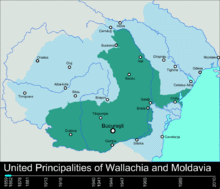 Animated map depicting the territorial changes of Romania from 1859 to 2010
Animated map depicting the territorial changes of Romania from 1859 to 2010The Treaty of Küçük Kaynarca authorised the Russian ambassador in Istanbul to defend the autonomy of Moldavia and Wallachia (known as the Danubian Principalities) in 1774.[103] Taking advantage of the Greek War of Independence, a Wallachian lesser nobleman, Tudor Vladimirescu, stirred up a revolt against the Ottomans in January 1821, but he was murdered in June by Phanariot Greeks.[104] After a new Russo-Turkish War, the Treaty of Adrianople strengthened the autonomy of the Danubian Principalities in 1829, although it also acknowledged the sultan's right to confirm the election of the princes.[105]
Mihail Kogălniceanu, Nicolae Bălcescu and other leaders of the 1848 revolutions in Moldavia and Wallachia demanded the emancipation of the peasants and the union of the two principalities, but Russian and Ottoman troops crushed their revolt.[106][107] The Wallachian revolutionists were the first to adopt the blue, yellow and red tricolour as the national flag.[108] In Transylvania, most Romanians supported the imperial government against the Hungarian revolutionaries after the Diet passed a law concerning the union of Transylvania and Hungary.[108] Bishop Andrei Șaguna proposed the unification of the Romanians of the Habsburg Monarchy in a separate duchy, but the central government refused to change the internal borders.[109]
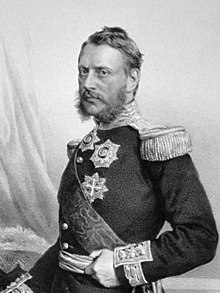 Alexandru Ioan Cuza, the first Domnitor (i.e. Prince) of Romania (at that time the United Principalities of Wallachia and Moldavia) between 1862 and 1866
Alexandru Ioan Cuza, the first Domnitor (i.e. Prince) of Romania (at that time the United Principalities of Wallachia and Moldavia) between 1862 and 1866The Treaty of Paris put the Danubian Principalities under the collective guardianship of the Great Powers in 1856.[107] After special assemblies convoked in Moldavia and Wallachia urged the unification of the two principalities, the Great Powers did not prevent the election of Alexandru Ioan Cuza as their collective domnitor (or ruling prince) in January 1859.[110] The united principalities officially adopted the name Romania on 21 February 1862.[111] Cuza's government carried out a series of reforms, including the secularisation of the property of monasteries and agrarian reform, but a coalition of conservative and radical politicians forced him to abdicate in February 1866.[112][113]
Cuza's successor, a German prince, Karl of Hohenzollern-Sigmaringen (or Carol I), was elected in May.[114] The parliament adopted the first constitution of Romania in the same year.[115] The Great Powers acknowledged Romania's full independence at the Congress of Berlin and Carol I was crowned king in 1881.[116] The Congress also granted the Danube Delta and Dobruja to Romania.[116] Although Romanian scholars strove for the unification of all Romanians into a Greater Romania, the government did not openly support their irredentist projects.[117]
The Transylvanian Romanians and Saxons wanted to maintain the separate status of Transylvania in the Habsburg Monarchy, but the Austro-Hungarian Compromise brought about the union of the province with Hungary in 1867.[118] Ethnic Romanian politicians sharply opposed the Hungarian government's attempts to transform Hungary into a national state, especially the laws prescribing the obligatory teaching of Hungarian.[116] Leaders of the Romanian National Party proposed the federalisation of Austria-Hungary and the Romanian intellectuals established a cultural association to promote the use of Romanian.[119][120]
World Wars and Greater Romania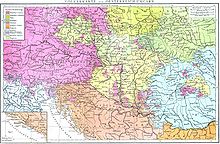 Late 19th century ethnic map of Central Europe depicting predominantly Romanian-inhabited territories in blue. Hungarians are marked in yellow and Germans in pink.
Late 19th century ethnic map of Central Europe depicting predominantly Romanian-inhabited territories in blue. Hungarians are marked in yellow and Germans in pink.Fearing Russian expansionism, Romania secretly joined the Triple Alliance of Germany, Austria-Hungary, and Italy in 1883, but public opinion remained hostile to Austria-Hungary.[121][122] Romania seized Southern Dobruja from Bulgaria in the Second Balkan War in 1913.[123] German and Austrian-Hungarian diplomacy supported Bulgaria during the war, bringing about a rapprochement between Romania and the Triple Entente of France, Russia and the United Kingdom.[123] The country remained neutral when World War I broke out in 1914, but Prime Minister Ion I. C. Brătianu started negotiations with the Entente Powers.[124] After they promised Austrian-Hungarian territories with a majority of ethnic Romanian population to Romania in the Treaty of Bucharest, Romania entered the war against the Central Powers in 1916.[124][125] The German and Austrian-Hungarian troops defeated the Romanian army and occupied three-quarters of the country by early 1917.[126] After the October Revolution turned Russia from an ally into an enemy, Romania was forced to sign a harsh peace treaty with the Central Powers in May 1918,[127] but the collapse of Russia also enabled the union of Bessarabia with Romania.[128] King Ferdinand again mobilised the Romanian army on behalf of the Entente Powers a day before Germany capitulated on 11 November 1918.[127]
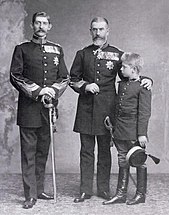 King Carol I of Romania with his nephew Ferdinand I of Romania and great-nephew Carol II of Romania
King Carol I of Romania with his nephew Ferdinand I of Romania and great-nephew Carol II of RomaniaAustria-Hungary quickly disintegrated after the war.[127] The General Congress of Bukovina proclaimed the union of the province with Romania on 28 November 1918, and the Grand National Assembly proclaimed the union of Transylvania, Banat, Crișana and Maramureș with the kingdom on 1 December.[129][130] Peace treaties with Austria, Bulgaria and Hungary delineated the new borders in 1919 and 1920, but the Soviet Union did not acknowledge the loss of Bessarabia.[131] Romania achieved its greatest territorial extent, expanding from the pre-war 137,000 to 295,000 km2 (53,000 to 114,000 sq mi).[132] A new electoral system granted voting rights to all adult male citizens, and a series of radical agrarian reforms transformed the country into a "nation of small landowners" between 1918 and 1921.[133] Gender equality as a principle was enacted, but women could not vote or be candidates.[134] Calypso Botez established the National Council of Romanian Women to promote feminist ideas.[134] Romania was a multiethnic country, with ethnic minorities making up about 30% of the population, but the new constitution declared it a unitary national state in 1923.[132][135][136] Although minorities could establish their own schools, Romanian language, history and geography could only be taught in Romanian.[137]
Agriculture remained the principal sector of economy, but several branches of industry—especially the production of coal, oil, metals, synthetic rubber, explosives and cosmetics—developed during the interwar period.[138][139] With oil production of 5.8 million tons in 1930, Romania ranked sixth in the world.[139] Two parties, the National Liberal Party and the National Peasants' Party, dominated political life, but the Great Depression in Romania brought about significant changes in the 1930s.[140][141] The democratic parties were squeezed between conflicts with the fascist and anti-Semitic Iron Guard and the authoritarian tendencies of King Carol II.[142] The King promulgated a new constitution and dissolved the political parties in 1938, replacing the parliamentary system with a royal dictatorship.[143][144]
 Romania's territorial losses in the summer of 1940. Of these territories, only Northern Transylvania was regained after the end of World War II.
Romania's territorial losses in the summer of 1940. Of these territories, only Northern Transylvania was regained after the end of World War II.The 1938 Munich Agreement convinced King Carol II that France and the United Kingdom could not defend Romanian interests.[145] German preparations for a new war required the regular supply of Romanian oil and agricultural products.[145] The two countries concluded a treaty concerning the coordination of their economic policies in 1939, but the King could not persuade Adolf Hitler to guarantee Romania's frontiers.[146] Romania was forced to cede Bessarabia and Northern Bukovina to the Soviet Union on 26 June 1940, Northern Transylvania to Hungary on 30 August, and Southern Dobruja to Bulgaria in September.[147] After the territorial losses, the King was forced to abdicate in favour of his minor son, Michael I, on 6 September, and Romania was transformed into a national-legionary state under the leadership of General Ion Antonescu.[148] Antonescu signed the Tripartite Pact of Germany, Italy and Japan on 23 November.[149] The Iron Guard staged a coup against Antonescu, but he crushed the riot with German support and introduced a military dictatorship in early 1941.[150]
 American B-24 Liberator flying over a burning oil refinery at Ploiești, as part of Operation Tidal Wave on 1 August 1943. Due to its role as a significant supplier of oil to the Axis, Romania was a prime target of Allied strategic bombing in 1943 and 1944.
American B-24 Liberator flying over a burning oil refinery at Ploiești, as part of Operation Tidal Wave on 1 August 1943. Due to its role as a significant supplier of oil to the Axis, Romania was a prime target of Allied strategic bombing in 1943 and 1944.Romania entered World War II soon after the German invasion of the Soviet Union in June 1941.[151] The country regained Bessarabia and Northern Bukovina, and the Germans placed Transnistria (the territory between the rivers Dniester and Dnieper) under Romanian administration.[152] Romanian and German troops massacred at least 160,000 local Jews in these territories; more than 105,000 Jews and about 11,000 Gypsies died during their deportation from Bessarabia to Transnistria.[153] Most of the Jewish population of Moldavia, Wallachia, Banat and Southern Transylvania survived,[154] but their fundamental rights were limited.[155] After the German occupation of Hungary in March 1944, about 132,000 Jews – mainly Hungarian-speaking – were deported to extermination camps from Northern Transylvania with the Hungarian authorities' support.[153][156]
After the Soviet victory in the Battle of Stalingrad in 1943, Iuliu Maniu, a leader of the opposition to Antonescu, entered into secret negotiations with British diplomats who made it clear that Romania had to seek reconciliation with the Soviet Union.[157] To facilitate the coordination of their activities against Antonescu's regime, the National Liberal and National Peasants' parties established the National Democratic Bloc, which also included the Social Democratic and Communist parties.[158] After a successful Soviet offensive, the young King Michael I ordered Antonescu's arrest and appointed politicians from the National Democratic Bloc to form a new government on 23 August 1944.[159] Romania switched sides during the war, and nearly 250,000 Romanian troops joined the Red Army's military campaign against Hungary and Germany, but Joseph Stalin regarded the country as an occupied territory within the Soviet sphere of influence.[160] Stalin's deputy instructed the King to make the Communists' candidate, Petru Groza, the prime minister in March 1945.[161][162] The Romanian administration in Northern Transylvania was soon restored, and Groza's government carried out an agrarian reform.[162] In February 1947, the Paris Peace Treaties confirmed the return of Northern Transylvania to Romania, but they also legalised the presence of units of the Red Army in the country.[163][164]
Communism King Michael I of Romania was forced to abdicate by the communists in late December 1947, simultaneously with the Soviet occupation of the country.
King Michael I of Romania was forced to abdicate by the communists in late December 1947, simultaneously with the Soviet occupation of the country.During the Soviet occupation of Romania, the communist-dominated government called for new elections in 1946, which they fraudulently won, with a fabricated 70% majority of the vote.[165] Thus, they rapidly established themselves as the dominant political force.[166] Gheorghe Gheorghiu-Dej, a communist party leader imprisoned in 1933, escaped in 1944 to become Romania's first communist leader. In February 1947, he and others forced King Michael I to abdicate and leave the country and proclaimed Romania a people's republic.[167][168] Romania remained under the direct military occupation and economic control of the USSR until the late 1950s. During this period, Romania's vast natural resources were drained continuously by mixed Soviet-Romanian companies (SovRoms) set up for unilateral exploitative purposes.[169][170][171]
In 1948, the state began to nationalise private firms and to collectivise agriculture.[172] Until the early 1960s, the government severely curtailed political liberties and vigorously suppressed any dissent with the help of the Securitate—the Romanian secret police. During this period the regime launched several campaigns of purges during which numerous "enemies of the state" and "parasite elements" were targeted for different forms of punishment including: deportation, internal exile, internment in forced labour camps and prisons—sometimes for life—as well as extrajudicial killing.[173] Nevertheless, anti-communist resistance was one of the most long-lasting and strongest in the Eastern Bloc.[174] A 2006 commission estimated the number of direct victims of the Communist repression at two million people.[175]
 Nicolae Ceaușescu, who ruled Romania as its communist leader from 1965 until 1989
Nicolae Ceaușescu, who ruled Romania as its communist leader from 1965 until 1989In 1965, Nicolae Ceaușescu came to power and started to conduct the country's foreign policy more independently from the Soviet Union. Thus, communist Romania was the only Warsaw Pact country which refused to participate in the Soviet-led 1968 invasion of Czechoslovakia. Ceaușescu even publicly condemned the action as "a big mistake, [and] a serious danger to peace in Europe and to the fate of Communism in the world".[176] It was the only Communist state to maintain diplomatic relations with Israel after 1967's Six-Day War and established diplomatic relations with West Germany the same year.[177] At the same time, close ties with the Arab countries and the Palestine Liberation Organization (PLO) allowed Romania to play a key role in the Israel–Egypt and Israel–PLO peace talks.[178]
The Romanian Revolution of 1989 was one of the few violent revolutions in the Iron Curtain that brought an end to communist rule.As Romania's foreign debt increased sharply between 1977 and 1981 (from US$3 billion to $10 billion),[179] the influence of international financial organisations—such as the International Monetary Fund (IMF) and the World Bank—grew, gradually conflicting with Ceaușescu's autocratic rule. He eventually initiated a policy of total reimbursement of the foreign debt by imposing austerity steps that impoverished the population and exhausted the economy. The process succeeded in repaying all of Romania's foreign government debt in 1989. At the same time, Ceaușescu greatly extended the authority of the Securitate secret police and imposed a severe cult of personality, which led to a dramatic decrease in the dictator's popularity and culminated in his overthrow in the violent Romanian Revolution of December 1989 in which thousands were killed or injured.
After a trial, Ceaușescu and his wife were executed by firing squad at a military base outside Bucharest on December 25, 1989.[180][181] The charges for which they were executed were, among others, genocide by starvation.
Contemporary period An anti-communist and anti-FSN rally in Bucharest (1990)
An anti-communist and anti-FSN rally in Bucharest (1990)After the 1989 revolution, the National Salvation Front (FSN), led by Ion Iliescu, took partial and superficial multi-party democratic and free market measures after seizing power as an ad interim governing body.[182][183] In April 1990, a sit-in protest contesting the results of that year's legislative elections and accusing the FSN, including Iliescu, of being made up of former Communists and members of the Securitate grew rapidly to become what was called the Golaniad. Peaceful demonstrations degenerated into violence, prompting the intervention of coal miners summoned by Iliescu. This episode has been documented widely by both local[184] and foreign media,[185] and is remembered as the June 1990 Mineriad.[186][187]
The subsequent disintegration of the Front produced several political parties, including most notably the Social Democratic Party (PDSR then PSD) and the Democratic Party (PD and subsequently PDL). The former governed Romania from 1990 until 1996 through several coalitions and governments, with Ion Iliescu as head of state. Since then, there have been several other democratic changes of government: in 1996 Emil Constantinescu was elected president, in 2000 Iliescu returned to power, while Traian Băsescu was elected in 2004 and narrowly re-elected in 2009.[188]
In 2009, the country was bailed out by the International Monetary Fund as an aftershock of the Great Recession in Europe.[189] In November 2014, Sibiu former FDGR/DFDR mayor Klaus Iohannis was elected president, unexpectedly defeating former Prime Minister Victor Ponta, who had been previously leading in the opinion polls. This surprise victory was attributed by many analysts to the implication of the Romanian diaspora in the voting process, with almost 50% casting their votes for Klaus Iohannis in the first round, compared to only 16% for Ponta.[190] In 2019, Iohannis was re-elected president in a landslide victory over former Prime Minister Viorica Dăncilă.[191]
 Romania saw large waves of protests against judicial reforms of the PSD-ALDE government during the 2017–2019 Romanian protests.
Romania saw large waves of protests against judicial reforms of the PSD-ALDE government during the 2017–2019 Romanian protests.The post–1989 period is characterised by the fact that most of the former industrial and economic enterprises which were built and operated during the communist period were closed, mainly as a result of the policies of privatisation of the post–1989 regimes.[192]
Corruption has been a major issue in contemporary Romanian politics.[193] In November 2015, massive anti-corruption protests which developed in the wake of the Colectiv nightclub fire led to the resignation of Romania's Prime Minister Victor Ponta.[194] During 2017–2018, in response to measures which were perceived to weaken the fight against corruption, some of the biggest protests since 1989 took place in Romania, with over 500,000 people protesting across the country.[195][196]
Nevertheless, there have been efforts to tackle corruption. A National Anticorruption Directorate was formed in the country in 2002. Relatively recently, in Transparency International's 2019 Corruption Perceptions Index, Romania's public sector corruption score deteriorated to 44 out of 100, reversing gains made in previous years.[197]
NATO and EU integration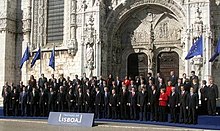 Romania joined the European Union in 2007 and signed the Treaty of Lisbon.
Romania joined the European Union in 2007 and signed the Treaty of Lisbon.After the end of the Cold War, Romania developed closer ties with Western Europe and the United States, eventually joining NATO in 2004, and hosting the 2008 summit in Bucharest.[198] The country applied in June 1993 for membership in the European Union and became an Associated State of the EU in 1995, an Acceding Country in 2004, and a full member on 1 January 2007.[199]
During the 2000s, Romania had one of the highest economic growth rates in Europe and has been referred at times as "the Tiger of Eastern Europe".[200] This has been accompanied by a significant improvement in living standards as the country successfully reduced domestic poverty and established a functional democratic state.[201][202] However, Romania's development suffered a major setback during the late 2000s' recession leading to a large gross domestic product contraction and a budget deficit in 2009.[203] This led to Romania borrowing from the International Monetary Fund.[204] Worsening economic conditions led to unrest and triggered a political crisis in 2012.[205]
Romania joined NATO in 2004 and hosted its 2008 summit in Bucharest.Romania still faces problems related to infrastructure,[206] medical services,[207] education,[208] and corruption.[209] Near the end of 2013, The Economist reported Romania again enjoying "booming" economic growth at 4.1% that year, with wages rising fast and a lower unemployment than in Britain. Economic growth accelerated in the midst of government liberalisations in opening up new sectors to competition and investment—most notably, energy and telecoms.[210] In 2016, the Human Development Index ranked Romania as a nation of "Very High Human Development".[211]
Following the experience of economic instability throughout the 1990s, and the implementation of a free travel agreement with the EU, a great number of Romanians emigrated to Western Europe and North America, with particularly large communities in Italy, Germany, and Spain. In 2016, the Romanian diaspora was estimated to be over 3.6 million people, the fifth-highest emigrant population in the world.[212]
^ a b Price 2013, pp. 60–61. ^ Georgescu 1991, pp. 1–2. ^ Price 2013, pp. 125–127. ^ Gibbs, Patrick. "Antiquity Vol 79 No 306 December 2005 The earliest salt production in the world: an early Neolithic exploitation in Poiana Slatinei-Lunca, Romania Olivier Weller & Gheorghe Dumitroaia". Antiquity.ac.uk. Archived from the original on 30 April 2011. Retrieved 12 October 2012. ^ Price 2013, p. 149. ^ John Noble Wilford (1 December 2009). "A Lost European Culture, Pulled From Obscurity". The New York Times (30 November 2009). Archived from the original on 23 April 2017. ^ a b c Georgescu 1991, p. 2. ^ Georgescu 1991, p. 3. ^ Hitchins 2014, p. 3. ^ Rustoiu 2005, pp. 32, 35–36. ^ a b c d e Hitchins 2014, p. 7. ^ Pop 1999, p. 14. ^ Pop 1999, pp. 14–15. ^ a b Georgescu 1991, p. 4. ^ Pop 1999, p. 15. ^ Hitchins 2014, pp. 9–10. ^ Georgescu 1991, p. 6. ^ Opreanu 2005, pp. 68–69, 97–98. ^ Pop 1999, pp. 22–23. ^ Hitchins 2014, pp. 13–14. ^ a b Georgescu 1991, p. 10. ^ Pop 1999, pp. 19–20. ^ Hitchins 2014, p. 14. ^ Opreanu 2005, pp. 105–107. ^ Georgescu 1991, pp. 8, 10. ^ Opreanu 2005, p. 108, 110–111. ^ a b c d e f Hitchins 2014, p. 16. ^ Heather 2010, pp. 116–117, 165. ^ a b Opreanu 2005, pp. 117–118. ^ Heather 2010, p. 151. ^ Heather 2010, pp. 151, 207–208. ^ Bóna 1994, pp. 66–67. ^ Curta 2006, p. 54. ^ Opreanu 2005, p. 131. ^ Heather 2010, pp. 395–397. ^ Bóna 1994, pp. 97–99. ^ Curta 2006, pp. 62–63. ^ Bóna, István (2001). "Southern Transylvania under Bulgar Rule". In Köpeczi, Béla; Barta, Gábor; Bóna, István; Makkai, László; Szász, Zoltán; Borus, Judit (eds.). History of Transylvania. Akadémiai Kiadó. ISBN 0-88033-479-7. ^ Curta 2006, pp. 168, 177. ^ Hitchins 2014, p. 37. ^ Curta 2006, pp. 123, 178. ^ Hitchins 2014, p. 20. ^ Georgescu 1991, pp. 14–15. ^ Sălăgean 2005, p. 140. ^ Pop 1999, p. 36. ^ Curta 2006, pp. 15–16 (note 41). ^ Sălăgean 2005, pp. 140–141. ^ Bóna 1994, p. 111. ^ Curta 2006, pp. 182–183. ^ Curta 2006, pp. 189–190. ^ Sălăgean 2005, p. 152. ^ Curta 2006, pp. 248–250. ^ Pop 1999, pp. 40–41. ^ Curta 2006, pp. 304–305. ^ Sălăgean 2005, p. 157. ^ Bóna 1994, p. 183. ^ Sălăgean 2005, pp. 158–159. ^ Bóna 1994, pp. 144–145. ^ a b Pop 1999, p. 43. ^ Hitchins 2014, p. 21. ^ Pop 1999, pp. 41–43. ^ Bóna 1994, p. 189. ^ Curta 2006, p. 408. ^ Heyd, Guglielmo. Le Colonie Commerciali Degli Italiani in Oriente Nel Medio Evo (in Italian). HardPress Publishing. p. 97. ^ Iliescu, Octavian. Revue Roumaine d'Histoire (Contributions à l'histoire des colonies génoises en Roumanie aux XIIIe – XVe siècles). Editions de l'Académie de la République socialiste de Roumanie. pp. 25–52. ^ Pop 1999, pp. 43–44. ^ Curta 2006, pp. 407, 414. ^ Pop 1999, p. 44. ^ Madgearu 2005a, pp. 54–55. ^ Spinei 2009, p. 76. ^ Pop 1999, p. 45. ^ Pop 1999, p. 46. ^ a b Georgescu 1991, p. 17. ^ Sălăgean 2005, p. 202. ^ Hitchins 2014, pp. 26–29. ^ Pop 1999, pp. 60–61, 63–66. ^ Pop 1999, pp. 61–62. ^ Georgescu 1991, pp. 30–31. ^ a b c Pop 1999, pp. 52–53. ^ Georgescu 1991, p. 41. ^ a b Pop 1999, p. 69. ^ Trócsányi & Miskolczy 1994, p. 419. ^ Georgescu 1991, p. 71. ^ Georgescu 1991, p. 54. ^ a b Hitchins 2014, p. 35. ^ Georgescu 1991, pp. 55–56. ^ Pop 1999, pp. 75–76. ^ Pop 1999, p. 79. ^ Georgescu 1991, p. 42. ^ Hitchins 2014, p. 60. ^ Hitchins 2014, p. 61. ^ Trócsányi & Miskolczy 1994, pp. 432–434. ^ Hitchins 2014, pp. 44–45. ^ Hitchins 2014, pp. 55–56. ^ Georgescu 1991, pp. 73–74. ^ Georgescu 1991, pp. 74–75, 78. ^ Pop 1999, p. 92. ^ Georgescu 1991, pp. 75–76. ^ a b Pop 1999, p. 87. ^ a b Trócsányi & Miskolczy 1994, pp. 427–428. ^ Georgescu 1991, pp. 89–90. ^ Hitchins 2014, pp. 73–74. ^ Hitchins 2014, p. 68. ^ Georgescu 1991, pp. 103–104. ^ Hitchins 2014, p. 81. ^ Pop 1999, p. 99. ^ a b Hitchins 2014, pp. 96–97. ^ a b Pop 1999, p. 100. ^ Hitchins 2014, p. 99. ^ Pop 1999, p. 108. ^ Hitchins 2014, pp. 105–106. ^ Pop 1999, pp. 109–111. ^ Hitchins 2014, pp. 109–111. ^ Pop 1999, p. 111. ^ Pop 1999, p. 112. ^ a b c Hitchins 2014, p. 118. ^ Georgescu 1991, p. 166. ^ Georgescu 1991, p. 157. ^ Hitchins 2014, p. 145. ^ Pop 1999, pp. 118–119. ^ Hitchins 2014, pp. 149–150. ^ Georgescu 1991, p. 165. ^ a b Hitchins 2014, p. 150. ^ a b Pop 1999, p. 122. ^ Hitchins 2014, p. 151. ^ Georgescu 1991, pp. 169–170. ^ a b c Hitchins 2014, p. 155. ^ Georgescu 1991, pp. 170–171. ^ Hitchins 2014, p. 156. ^ Pop 1999, pp. 124–125. ^ Pop 1999, p. 125. ^ a b Georgescu 1991, p. 189. ^ Hitchins 2014, p. 167. ^ a b Hitchins 2014, p. 180. ^ Pop 1999, p. 127. ^ Hitchins 2014, pp. 158, 183. ^ Hitchins 2014, p. 183. ^ Pop 1999, p. 128. ^ a b Hitchins 2014, p. 179. ^ Pop 1999, p. 129. ^ Hitchins 2014, pp. 167–169. ^ Hitchins 2014, pp. 167–168. ^ Hitchins 2014, pp. 174–175. ^ Georgescu 1991, p. 207. ^ a b Hitchins 2014, p. 198. ^ Hitchins 2014, pp. 198–199. ^ Pop 1999, pp. 131–132. ^ Pop 1999, p. 133. ^ Georgescu 1991, p. 213. ^ Georgescu 1991, pp. 214–215. ^ Hitchins 2014, p. 208. ^ Georgescu 1991, pp. 216–217. ^ a b International Commission on the Holocaust in Romania (28 January 2012). "Executive Summary: Historical Findings and Recommendations" (PDF). Final Report of the International Commission on the Holocaust in Romania. Yad Vashem (The Holocaust Martyrs' and Heroes' Remembrance Authority). Archived (PDF) from the original on 12 January 2012. Retrieved 28 January 2012. ^ Georgescu 1991, p. 222. ^ Hitchins 2014, p. 210. ^ Köpeczi 1994, p. 689. ^ Hitchins 2014, pp. 211–212. ^ Georgescu 1991, p. 219. ^ Hitchins 2014, p. 215. ^ Hitchins 2014, pp. 215, 221. ^ Georgescu 1991, pp. 223–224. ^ a b Pop 1999, p. 138. ^ Köpeczi 1994, p. 692. ^ Georgescu 1991, p. 224. ^ Giurescu, "'Alegeri' după model sovietic", p.17 (citing Berry), 18 (citing Berry and note); Macuc, p.40; Tismăneanu, p.113 ^ "Romania: Country studies – Chapter 1.7.1 "Petru Groza's Premiership"". Federal Research Division, Library of Congress. Archived from the original on 14 September 2008. Retrieved 31 August 2008. ^ "Romania". CIA – The World Factbook. Retrieved 31 August 2008. ^ "Romania – Country Background and Profile". ed-u.com. Archived from the original on 10 December 2008. Retrieved 31 August 2008. ^ Rîjnoveanu, Carmen (2003). "Romania's Policy of Autonomy in the Context of the Sino-Soviet Conflict" (PDF). Czech Republic Military History Institute, Militärgeschichtliches Forscheungamt. p. 1. Archived from the original (PDF) on 24 June 2008. Retrieved 31 August 2008. ^ Roper, Stephen D. (2000). Romania: The Unfinished Revolution. London: Routledge. p. 18. ISBN 978-90-5823-027-0. ^ Cioroianu, Adrian (2005). On the Shoulders of Marx. An Incursion into the History of Romanian Communism (in Romanian). Bucharest: Editura Curtea Veche. pp. 68–73. ISBN 978-973-669-175-1. ^ Stoica, Stan (2007). Dicționar de Istorie a României (in Romanian). Bucharest: Editura Merona. pp. 77–78, 233–34. ISBN 978-973-7839-21-3. ^ Ionițoiu, Cicerone (2000). Victimele terorii comuniste. Arestați, torturați, întemnițați, uciși. Dicționar (in Romanian). Bucharest: Editura Mașina de scris. ISBN 978-973-99994-2-7.[page needed] ^ Consiliul National pentru Studierea Ahivelor Securității, Bande, bandiți si eroi; Grupurile de rezistență și Securitatea (1948–1968), Editura Enciclopedica, București, 2003 ^ Raportul Comisiei Prezidențiale pentru Analiza Dictaturii Comuniste din România (PDF) (Report). Comisia Prezidențială pentru Analiza Dictaturii Comuniste din România. 15 December 2006. pp. 215–217. ^ Political Tension 1968 (in Romanian). Bucharest: British Pathé. 21 August 1968. Archived from the original on 21 August 2014. ^ "Romania: Soviet Union and Eastern Europe". Country Studies.us. Archived from the original on 5 July 2009. Retrieved 31 August 2008. ^ "Middle East policies in Communist Romania". Country Studies.us. Archived from the original on 5 July 2009. Retrieved 31 August 2008. ^ Deletant, Dennis. "New Evidence on Romania and the Warsaw Pact, 1955–1989" (PDF). Cold War International History Project e-Dossier Series. Archived (PDF) from the original on 17 January 2012. ^ "EVOLUTION IN EUROPE; Ceausescu Wept as He Faced Firing Squad, Footage Shows". The New York Times. 23 April 1990. Retrieved 10 August 2022. ^ "Upheaval in the East; Report on Ceausescus' Burial". New York Times. 27 January 1990. Retrieved 10 August 2022. ^ Carothers, Thomas. "Romania: The Political Background" (PDF). Archived from the original (PDF) on 27 August 2008. Retrieved 31 August 2008. This seven-year period can be characterised as a gradualistic, often ambiguous transition away from communist rule towards democracy. ^ Hellman, Joel (January 1998). "Winners Take All: The Politics of Partial Reform in Postcommunist". Transitions World Politics. 50 (2): 203–234. doi:10.1017/S0043887100008091. S2CID 55115094. ^ "Institutul de Investigare a Crimelor Comunismului și Memoria Exilului Românesc". mineriade.iiccr.ro. Archived from the original on 22 August 2011. Retrieved 14 March 2011. ^ "Institutul de Investigare a Crimelor Comunismului și Memoria Exilului Românesc". mineriade.iiccr.ro. Archived from the original on 22 August 2011. Retrieved 14 March 2011. ^ Bohlen, Celestine (15 June 1990). "Evolution in Europe; Romanian miners invade Bucharest". The New York Times. Retrieved 31 August 2008. Responding to an emergency appeal by President Ion Iliescu, thousands of miners from northern Romania descended on the capital city today ^ "Institutul de Investigare a Crimelor Comunismului și Memoria Exilului Românesc". mineriade.iiccr.ro. Archived from the original on 22 August 2011. Retrieved 14 March 2011. ^ Presa internationala despre alegerile din Romania: Traian Basescu a castigat la limita; Romanii au mici sperante sa se dezghete ajutorul de la FMI – International Archived 4 March 2016 at the Wayback Machine. HotNews.ro. Retrieved on 21 August 2010. ^ Reguly, Eric (20 May 2014). "In Gold Blood". Newsweek. ^ "Romania profile – Leaders – BBC News-GB". BBC News. 20 April 2012. Archived from the original on 17 July 2016. Retrieved 28 June 2016. ^ France-Presse, Agence (24 November 2019). "Romanian centrist president re-elected by a landslide". The Guardian. ^ Popescu, Claudia. "Deindustrialization and Urban Shrinkage in Romania. What Lessons for the Spatial Policy?". Archived from the original on 31 December 2016. Retrieved 8 October 2016. ^ Ilie, Luiza (October 2015). "Romania's powerful mayors tumble in corruption crackdown". Reuters. ^ "Romania PM Ponta resigns over Bucharest nightclub fire Archived 15 November 2015 at the Wayback Machine". BBC News. 4 November 2015. ^ "Huge Romania rally despite decree repeal". BBC News. 6 February 2017. ^ Marinas, Radu-Sorin (26 November 2017). "Thousands of Romanians rally against ruling party's judicial overhaul". Reuters. ^ "Corruption Perceptions Index 2019". transparency.org. Transparency International. Retrieved 19 February 2020. ^ "NATO update: NATO welcomes seven new members". NATO. Archived from the original on 11 September 2008. Retrieved 31 August 2008. ^ "EU approves Bulgaria and Romania". BBC News. 26 September 2006. Archived from the original on 3 December 2008. Retrieved 31 August 2008. ^ "Adevarul". Adevarul.ro. Archived from the original on 20 September 2008. Retrieved 25 September 2010. ^ Human Development Report 2009 – Country Fact Sheets – Romania Archived 1 November 2013 at the Wayback Machine. Hdrstats.undp.org. Retrieved on 21 August 2010. ^ Tracking the Millennium Development Goal Archived 26 November 2013 at the Wayback Machine. MDG Monitor. Retrieved on 21 August 2010. ^ Joe Parkinson (4 December 2009). "Romania Faces Crucial Vote". Wall Street Journal. Archived from the original on 10 July 2017. ^ "Romania and the IMF". IMF. Archived from the original on 9 April 2015. ^ Gheorghe Stoica; Lavinia Stan. "Romanian Politics in 2012: Intra-Cabinet Coexistence and Political Instability". South-East European Journal of Political Science. Archived from the original on 24 February 2014. ^ "Romania's Infrastructure and International Transport Links". Assessment of the Romanian Economy. Romania Central. Archived from the original on 21 March 2009. Retrieved 21 August 2010. ^ Romania, world's 53rd country in quality of life index – Denisa Morariu. Denisamorariu.wordpress.com (8 January 2010). Retrieved on 21 August 2010. ^ Sistemul de invatamant distrus de lipsa reformelor – Cluj Archived 5 October 2011 at the Wayback Machine. citynews.ro. Retrieved on 21 August 2010. ^ D+C 2010/03 – Focus – Roos: In Romania and Bulgaria, civil-society organisations are demanding rule of law – Development and Cooperation – International Journal Archived 9 August 2011 at the Wayback Machine. Inwent.org. Retrieved on 21 August 2010. ^ "Romania is booming". The Economist. 17 December 2013. Archived from the original on 1 July 2017. ^ "Human Development Report 2016 – "Human Development for Everyone"" (PDF). HDRO (Human Development Report Office) United Nations Development Programme. Archived (PDF) from the original on 25 August 2017. Retrieved 22 March 2017. ^ "Report: Romanian diaspora, fifth largest in the world". Romania Insider. 16 July 2019.
- Stay safe
While violence against foreign tourists is rare, this does not mean you should leave your common sense at home, if you decide to vacation in Romania. Generally crime is limited to petty thefts and common scams, and not much else that would concern the tourist. Wherever you may be in the country, ask trusted locals about the surroundings, they will gladly give you a few pointers.
Although racial prejudice exists in Romania, especially toward those who look like Roma (“gypsies”), hate crimes are rare. Some homophobic prejudice also remains, for instance an annual gay pride parade in Bucharest has been the scene of violent protests in past years.
Emergency phone numbersRomania uses the pan-European standard number 112 for all emergency calls since 2004. Therefore, this is the only number you will need to remember for police, ambulance and the fire department.
Petty crimeRomania is quite safe, with very little violent crime. Pickpocketing and scams (such as taxi scams or confidence tricks) are present on a wider scale, so exert care especially in crowded places (such as train stations, some markets, urban public transport). Keep your money or valuables in inner pockets of your backpack and always watch your handbag in said crowded areas. When traveling with a cab, always make sure you read and remember the price per kilometer that's written on the outside of the car, because some of the drivers may try to take advantage of the fact that you are not familiar with the prices.
...Read moreStay safeRead lessWhile violence against foreign tourists is rare, this does not mean you should leave your common sense at home, if you decide to vacation in Romania. Generally crime is limited to petty thefts and common scams, and not much else that would concern the tourist. Wherever you may be in the country, ask trusted locals about the surroundings, they will gladly give you a few pointers.
Although racial prejudice exists in Romania, especially toward those who look like Roma (“gypsies”), hate crimes are rare. Some homophobic prejudice also remains, for instance an annual gay pride parade in Bucharest has been the scene of violent protests in past years.
Emergency phone numbersRomania uses the pan-European standard number 112 for all emergency calls since 2004. Therefore, this is the only number you will need to remember for police, ambulance and the fire department.
Petty crimeRomania is quite safe, with very little violent crime. Pickpocketing and scams (such as taxi scams or confidence tricks) are present on a wider scale, so exert care especially in crowded places (such as train stations, some markets, urban public transport). Keep your money or valuables in inner pockets of your backpack and always watch your handbag in said crowded areas. When traveling with a cab, always make sure you read and remember the price per kilometer that's written on the outside of the car, because some of the drivers may try to take advantage of the fact that you are not familiar with the prices.
Animals Bear warning sign
Bear warning signRomania has a very large population of wild animals, including one of the largest populations of wild bears in Europe. Bears are deadly, and even the ones living closer to cities, which loot garbage containers, must not be approached. It is commonplace for bears to visit city neighborhoods situated near mountain forests in search for food (such as in Brașov). As such, spotting a bear or wolf is fairly easy. Although usually not dangerous, such animals may become aggressive if care is not taken. If you spot a bear or wolf when hiking, it is advisable to slowly turn around and slowly walk the other way. Local shepherds advise people who are wild camping to camp out in the open rather than under trees where possible to avoid the bears. Under any circumstances, do not attempt to run or try to feed the animal, as it may become disoriented and attack. In 2006, 6 people were killed by wild animals in Romania. There have also been cases in which tourists encountered bear cubs and attempted to feed or play with them. In some cases this has turned out to be a fatal mistake. If you happen to encounter any sort of young animals be aware their parents are somewhere close. The best thing you can do is leave the area as soon as possible, as cuddly and cute as bear cubs may be, their parents are not. Bears are extremely aggressive when they have cubs and will attack at the slightest hint of a threat to their cubs. This is one of the leading causes of attacks by animals on people.
Feral animals such as stray dogs may additionally pose a problem in Bucharest and other major cities, where they are widespread. Some might not be aggressive, but be careful about animals in packs and at night. Some are taken care of by people from nearby housing blocks and these can be especially territorial and can sometimes attack without warning. The number of stray dogs is declining but is still relatively high and overall they are the biggest physical danger especially in remote areas.
Romanian farmers also use dogs for herding and protecting sheep. You'll most likely see this if you're walking near any farms, on dirt roads, or rural areas. You can tell they are sheep dogs as farmers usually attach horizontally-hanging sticks under their necks. If you encounter one of these dogs, it might appear scared at first, and might be looking backwards. It is indeed scared, but it is not looking for retreat: it's looking for its other doggy friends! If you continue walking towards their territory or whatever herd of sheep they are protecting, they will most certainly become more and more defensive, and have no doubt that more and more will appear as you get closer to the herd. In situations like this, you simply need to back off. It's not worth attempting to defend yourself either, as Romanian farmers will get very angry. If you are in a rural area, consider waiting for a horse-drawn wagon or car for hitchhiking: this is the best way to cross such territories.
CorruptionSome visitors may encounter corrupt policemen (Polițiști) and customs officials (Vameși, Ofițeri de vamă) first hand, even though this seems to be a declining problem. While it may be tempting to pay a bribe (mită or șpagă) to smooth things along on your visit, you should avoid doing so as it only contributes to this problem. It is also illegal to give bribes as well as to receive them. Foreigners might receive tougher sentences in Romania.
A piece of good advice for when you find yourself in the situation to be asked to pay a bribe (or just suggested) is to politely reject the proposal, stating clearly that you would not do that. If you are being harassed adopt a swift and determined attitude, and threaten that you will immediately call the police. This will almost surely make whoever is asking for the bribe stop and leave you alone.


















































